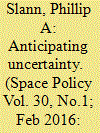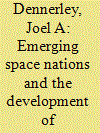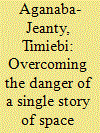|
|
|
Sort Order |
|
|
|
Items / Page
|
|
|
|
|
|
|
| Srl | Item |
| 1 |
ID:
147515


|
|
|
|
|
| Summary/Abstract |
Terrestrial societies are heavily dependent on Earth-orbiting satellites for the provision of services which many people now take for granted. However, with this dependence comes a need to preserve the transmission of these services whilst faced with a number of risks and dangers, including intentional interference, space debris and radiation emanating from space weather phenomena. The European Union (EU) has identified these services, along with the satellites and networks which provide them to its citizens, as critical infrastructures, indicating the need for their security. The article frames the EU's efforts to secure its critical outer space infrastructures, namely the draft International Code of Conduct for Outer Space Activities and the Space Situational Awareness programme, through the lens of anticipatory security. The article concludes that both these approaches to outer space security are predicated upon the precautionary acknowledgement of risks or threats and involve mostly preemptive measures alongside some elements of prevention.
|
|
|
|
|
|
|
|
|
|
|
|
|
|
|
|
| 2 |
ID:
147518


|
|
|
|
|
| Summary/Abstract |
The principle of international cooperation underpins space law and therefore space activities. In certain respects, international cooperation in regards to various spatial activities is and has been fostered effectively. However, in relation to the development of international regulations and standards applicable to outer space, the principle of international cooperation has not been applied as effectively or collaboratively as it might have been. The development of international regulatory regimes and industry standards can run the risk of being dominated by more powerful, industrialized countries that invest resources and time into ensuring that their technology, as well as their regulatory and standards agendas prevail. This phenomenon has the potential to affect the global space industry, where the future development of space law may exhibit a bias in favour of established space nations over emerging space nations. This is because established space nations tend to be, and have greater capacity to be, more active in international standard setting and in the formulation of space regulations. These States often compliment their high levels of economic investment in space with a corresponding political will to promote space endeavours, as well as shape appropriate laws and regulations around their respective space industries. Emerging space nations that are serious about developing their international space presence must adopt a similar strategy if they are to make any meaningful contribution to the future evolution of international space law. If this does not happen, we may witness an international space law regime that favours some States over others, by virtue of the fact that certain States are more active in standards setting. This in turn would diminish of the impact of the principle of international cooperation between States in relation to outer space activities. This article examines the principle of international cooperation in space, and how it relates to the development of international regulatory regime and standards. In particular, the article highlights the inequality than can manifest between established space nations and emerging space nations in regards to the how space regulations and standards are formulated and ultimately adopted.
|
|
|
|
|
|
|
|
|
|
|
|
|
|
|
|
| 3 |
ID:
147519


|
|
|
|
|
| Summary/Abstract |
There is a growing consensus among stakeholders around the world that the long-term objective of human space exploration is the long-duration presence of humans on the surface of Mars. However, the key question concerns the choice of near-term missions that will bridge current human spaceflight activities in low Earth orbit (LEO) and eventual Mars exploration. This paper contributes to this debate by identifying the scope of possible near-term missions, arguing that there are only four realistic proposals for initial human exploration beyond low Earth orbit: a cis-lunar habitat, asteroid redirect, Mars flyby, and a short lunar surface sortie. The paper then evaluates these missions across five criteria: 1) technical/economic feasibility, 2) contribution to the eventual goal of exploring Mars, 3) potential for international cooperation, 4) global readiness for the mission, and 5) political feasibility to establish a clear assessment of the pros and cons of each of these four missions. While recognizing that any one of these missions represents a feasible option for future human space exploration, we recommend that the international community pursue development of a cis-lunar habitat as its immediate goal. This mission maximizes development of technology necessary for Mars exploration, provides significant opportunities for meaningful international participation, and could be achieved on a reasonable schedule with current budgets. Both the asteroid redirect mission and lunar exploration plans have the potential to benefit from the development of a cis-lunar habitat and could be retained as intermediate or parallel missions, as resources allow.
|
|
|
|
|
|
|
|
|
|
|
|
|
|
|
|
| 4 |
ID:
147516


|
|
|
|
|
| Summary/Abstract |
space governance issues from the perspective of emerging or aspirant space actors and users because it helps to highlight imbalances and asymmetry around the “legal right” to space benefit under Article I(1) of the Outer Space Treaty. However, a new analytical lens focused on Cosmopolitan Approaches to International Law or CAIL is proposed that can deconstruct the existing agenda in light of it obscuring the idea of shared benefits without attributing blame, scepticism or negativity. In the quest to ensure fairness to all, including aspirant emerging space actors, largely from developing States, this paper asks what does one learn from the space law context that prompts us to reorient the frame of analysis that Third World Approaches to International Law (TWAIL) perspective brings to bear and focus on a CAILian perspective? Primarily that a TWAILian approach is too one sided and polarized. A CAILian approach however acknowledges reciprocal responsibilities. In conclusion, I am not making a claim here that my CAILian concept has never been articulated before. However, the way I link the concept of Cosmopolitanism with a school of thought that I am sympathetic to (TWAIL) is where this paper provides a novel idea. My specific version of Cosmopolitanism bears in mind the importance of collective ideas. While CAIL will not be free from power asymmetry's because there will always be polarity; it still chooses to focus on the middle ground and not to focus on extremes.
|
|
|
|
|
|
|
|
|
|
|
|
|
|
|
|
| 5 |
ID:
147517


|
|
|
|
|
| Summary/Abstract |
Canada and the UK have held a joint annual colloquium since 1971. The 2015 meeting, held in Glasgow in November, for the first time chose (near-Earth) space as its topic. This report presents some of the highlights and proposals from discussions at the event.
|
|
|
|
|
|
|
|
|
|
|
|
|
|
|
|
| 6 |
ID:
147520


|
|
|
|
|
| Summary/Abstract |
In January 2016, a debate was held on UK space policy in the House of Commons, timed to coincide with the extravehicular activity (EVA) undertaken by British astronaut Major Tim Peake as part of his mission to the International Space Station (ISS). UK participation in ISS activities marked the culmination of a significant reorientation of government space policy in recent years, and analysis of the parliamentary debate facilitates insight into the nature of that reorientation, and the policy goals that lay at its heart. It also delineates three key themes which underpinned the parliamentary debate: the novelty of space policy as a topic of political discussion in parliament; the use of the parliamentary arena as a means through which MPs champion their constituencies as prime locations for valuable economic benefits associated with the space sector; and the portrayal of space as a source of inspiration and driver of aspiration, and as an opportunity for a vigorous space industry policy. The paper argues for the utility of parliamentary analysis as a way to enrich our understanding of the evolution of contemporary UK space policy.
|
|
|
|
|
|
|
|
|
|
|
|
|
|
|
|
|
|
|
|
|